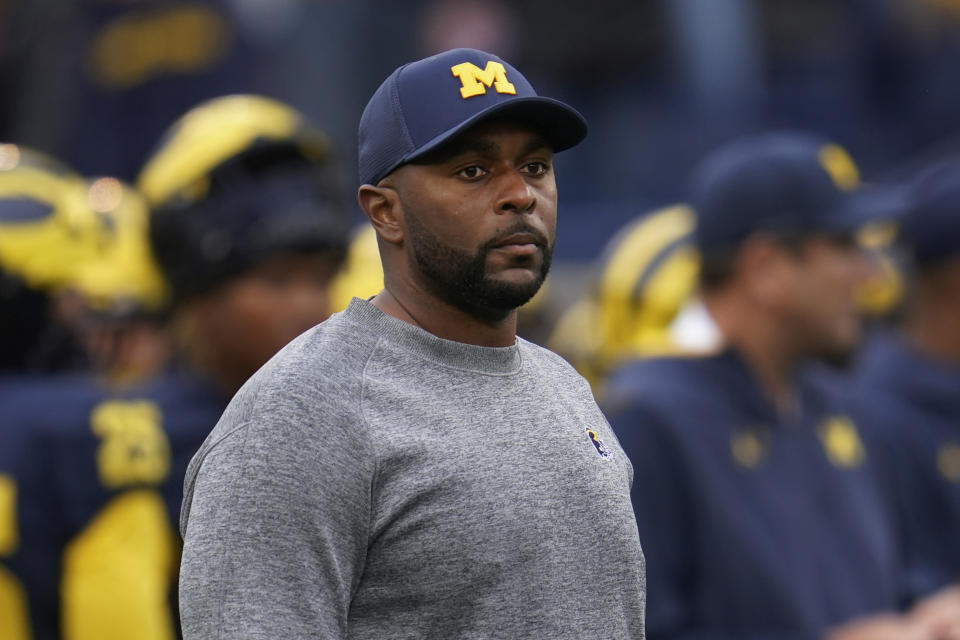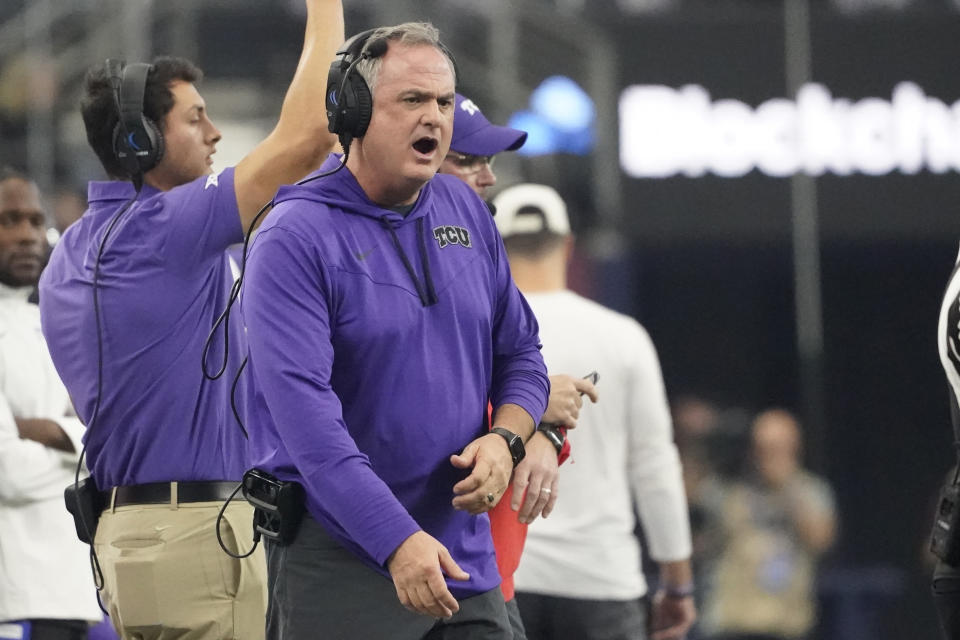Rising stars: Michigan's Moore, TCU's Riley guide CFP teams
- Oops!Something went wrong.Please try again later.
- Oops!Something went wrong.Please try again later.
- Oops!Something went wrong.Please try again later.
- Oops!Something went wrong.Please try again later.
- Oops!Something went wrong.Please try again later.
- Oops!Something went wrong.Please try again later.
SCOTTSDALE, Ariz. (AP) — TCU's Garrett Riley seemed destined to follow his big brother into coaching when he walked on to the Texas Tech football team as a player.
Michigan's Sherrone Moore's path to the profession was not quite so straight forward, but by the time he was done playing he was confident coaching was his calling.
The two offensive coordinators are rising stars as they square off at the Fiesta Bowl in a College Football Playoff semifinal Saturday between No. 2 Michigan and No. 3 TCU. A couple of millennials with old souls, Moore and Riley seem to be on a fast track to head coaching jobs — eventually.
“When the time comes, the time comes, but I’m in no rush to leave this place, this great university, these students and coach (Jim) Harbaugh,” the 36-year-old Moore said this week.
Riley, the 33-year-old younger brother of USC coach Lincoln Riley, also tries to live in the moment.
“I think the approach that I’ve always had is, man, you’re in the big time wherever you’re at,” he said.
Moore didn't start playing football until his junior year of high school, when he realized 6-foot-4 power forwards didn't have much of a future in basketball.
He played in junior college before landing at Oklahoma and playing two seasons for coach Bob Stoops in 2006 and '07. It was during that time he started to consider a career in coaching.
“I wanted to influence young men. I wanted to watch them grow. I wanted to be a part of their lives forever,” Moore said. “So that was my main main goal. And I love the game."
He started as a graduate assistant at Louisville and when Charlie Strong took over as head coach there, Moore quickly earned the trust of offensive coordinator Shawn Watson.
“Sharrone was unique from the very beginning because he was eager to learn,” said Watson, a longtime Power Five assistant who is now head coach at Wofford.
Working for Watson and offensive line coach David Borbely, Moore was promoted to tight ends coach and his role quickly expanded to also handle pass protection during game planning.
When Strong left for Texas, Moore was not among the coaches who moved to Austin. He spent the next four years at Central Michigan. The opportunity to join Harbaugh's staff at Michigan in 2018 came out of nowhere.
Dan Enos, the former Central Michigan head coach, had agreed to take a spot on Harbaugh's staff at the end of 2017 as receivers coach. Six weeks later, Enos took a job at Alabama and recommended Moore to Harbaugh.
Since then, Moore and Harbaugh have become like family.
"The connection we have is very strong, the bond we have is very strong. Love him with all my heart,” Moore said.
When offensive coordinator Josh Gattis left Michigan to take the same job at Miami after last season's playoff run for the Wolverines, Harbaugh promoted Moore from tight ends coach to co-offensive coordinator and offensive line coach.
Michigan for the second straight year won the Joe Moore Award given to the nation's best offensive line. Michigan is third in the nation in rushing at 5.64 yards per carry, and Moore's vision and experience with heavy personnel groupings that use multiple tight ends has given the Wolverines the explosive, run-heavy offense that Harbaugh has always strived for.
Harbaugh gushed about Moore, saying he was “like a brother.”
“They don't get any better,” Harbaugh said. “He's a great teacher. Tremendous passion for the game and for our players, Bleeds blue like nobody else. Smart. Wicked smart. In every way a Michigan man. He's not afraid of any challenge.”
TCU coach Sonny Dykes does the same when talking about Riley, who has quickly gained a reputation — like his older brother — for being one of the best play callers in college football.
“I think he’s patient,” Dykes said. “I can remember my first time as a play caller, I wanted to score a touchdown on every play. And sometimes that’s good and sometimes it can be really, really bad. And I think Garrett's much more patient, much more mature, his approach is than I was early on as a play caller.”
TCU ranks 10th in the nation in yards per play at 6.84 and senior quarterback Max Duggan developed into a Heisman Trophy finalist under Riley's tutelage.
Coming out of the tiny West Texas town of Muleshoe, Riley was a walk-on quarterback at Texas Tech when Mike Leach was head coach and Lincoln Riley was receivers coach.
Like so many who played and worked for Leach, who died suddenly at 61 earlier this month, Riley was captivated by the Air Raid offense and what felt like a cutting-edge approach to football.
“I was just very fortunate to be around a great group of guys at that point in time and an exciting time in college football and so that was probably when it started for me was in the college days,” Riley said.
Ruffin McNeill, Leach's longtime defensive coordinator at Texas Tech, gave Garrett Riley his entry into college coaching. McNeill was head coach at East Carolina when he brought Riley on as a graduate assistant and then made him a receivers coach.
McNeill, now a special assistant at North Carolina State, said Garrett Riley had the same “twinkle” in his eye that Lincoln did — smart and confident, but humble enough to put in the grunt work.
“They didn’t mind starting from the ground up, which for an old-school guys is much appreciated nowadays. There wasn’t a silver spoon given to them,” McNeill said.
After some tough years at Kansas and one excellent season as Appalachian State's offensive coordinator, Garrett Riley joined Dykes, another Leach protege, at SMU.
Lincoln Riley was hired as head coach at Oklahoma at 33. Garrett probably won't match that, but there have been suitors for his services.
“When I was 33 years old, I probably would have taken some of the opportunities that Garrett's maybe had opportunity to take, but again, I think it just shows his maturity," Dykes said. “I think he has a real focus and a real understanding of what the next move needs to be for him.”
___
Follow Ralph D. Russo at https://twitter.com/ralphDrussoAP and listen at http://www.appodcasts.com
___
AP college football: https://apnews.com/hub/college-football and https://twitter.com/ap_top25


